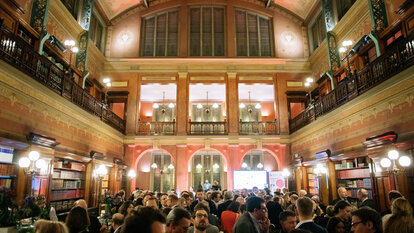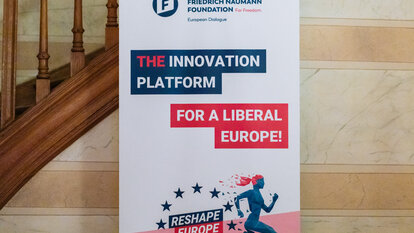New Year's Reception in Brussels
Liberal Impulses for Europe's Future
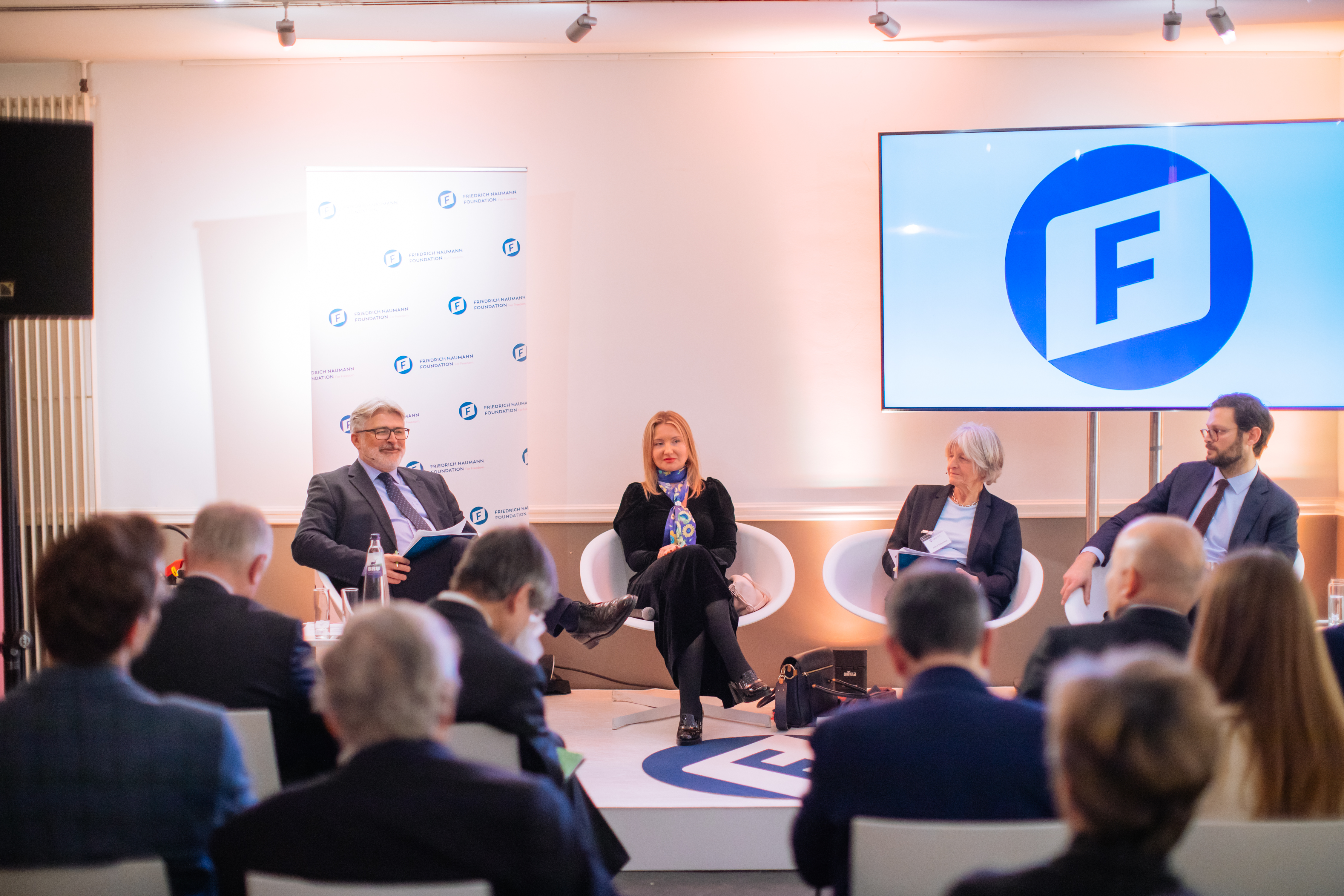
Roman Jakič, Leiter des südosteuropäischen liberalen Netzwerks LIBSEEN, die ukrainische Aktivistin Dr. Marta Barandiy, Gründerin der NGO Promote Ukraine; Anne Brasseur, Vorstandsmitlied der Friedrich-Naumann-Stiftung; Dr. Antonios Nestoras, Interimsdirektor des European Liberal Forum. (v.l.n.r.)
© FNF EuropeAt the Bibliothèque Solvay, the dignified stronghold of knowledge on the hill of the royal Leopold Park in the European capital of Brussels, the New Year's reception of the European Dialogue Program of the Friedrich Naumann Foundation for Freedom took place on January 31, 2023, with approximately 200 guests. The range of topics at the gathering of European liberals was broad from questions about the expansion and deepening of European integration to a discussion of the role and responsibility of the EU in the world.
The event started with a panel discussion led by board member Anne Brasseur on the further development of the European Union's enlargement policy. The enlargement process has stagnated in the past ten years, according to the unanimous opinion of the panel, which consisted of the interim director of the European Liberal Forum, Dr. Antonios Nestoras, the head of the southeast European liberal network LIBSEEN, Roman Jakič, and Ukrainian activist Dr. Marta Barandiy, founder of the NGO Promote Ukraine. Although the EU's enlargement policy could be seen as a failure in the last decade, the previous enlargement rounds are considered the EU's biggest foreign policy success, according to Dr. Antonios Nestoras.
Urgent Need for Flexibilization of the Accession Procedure
According to Roman Jakič, the classification of Ukraine and Moldova as EU candidate countries in summer 2022 was driven mainly by geopolitical considerations. Given this urgency, a possible accession of Ukraine around 2040 is much too late. Russia started the war against Ukraine because it longs for freedom, European rights and values. However, Dr. Marta Barandiy stated that the Ukrainian civil society's will to join the European house has existed for a long time before Russia's brutal invasion, particularly since the larger enlargement round of 2004. With the European Political Community, a new exchange forum has been created, in which 44 heads of state and government of the EU, the accession countries and other potential candidate countries participate.
According to Barandiy, any additional dialogue between the EU and the accession countries should initially be evaluated positively. However, it still needs to be shown to what extent this platform can also serve to concretise accession and the necessary revision of the enlargement procedure. A reform of the enlargement process is also urgently needed and should rather be transformed into a multi-stage procedure with intermediate steps, according to Dr. Antonios Nestoras. It cannot be that accession remains a either/or option, said the head of ELF. Rather, the European Union must strive to gradually bind the accession candidates to the EU. Promising in this context is the Berlin process driven by Germany, which contributes with concrete initiatives, amongst other things, to the regional networking of the Western Balkans countries and supports the way towards visa liberalisations, according to the assessment of the LIBSEEN Chairman Jakič.
Although it will still take some time for the final admission of the Western Balkans countries and states of the Eastern Partnership, it is now important that the EU positions itself within the framework of urgently needed institutional reforms so that it can become an active and effective actor on a global scale, according to the conclusion of the panel participants.
Strengthening the Geopolitical Role of the EU and its own Capabilities
At the New Year's reception following the panel, Nicola Beer, Vice President of the European Parliament and leader of the German delegation in the liberal Renew-Europe faction, highlighted the importance of Europe's role in the world. Understanding oneself as a geopolitical union is the top priority of the hour. To achieve this, it is essential that the European Union strengthens its own ability to act and improves its resilience. To remain competitive in the race for demands for more and more aid and subsidy-based investment injections, the EU should invest in the training of its workforce and the innovation capacity of its companies and diversify its trade relationships worldwide, according to Beer.
The Chairman of the Board of the Friedrich Naumann Foundation for Freedom, Professor Dr. Karl-Heinz Paqué, struck a similar chord. Putin's invasion of Ukraine should serve as a wake-up call for the liberal world, according to Paqué. Freedom, the rule of law, and open societies are valuable goods that must be fought for. First and foremost, the fight against populism and the promotion of the rule of law in Europe must take precedence. Secondly, the EU must not fall into the American protectionism trap, but must build its trade and investment relationships with friendly states worldwide as part of a new alliance of democracies. New trade agreements with countries like Australia, New Zealand, Chile, or Mexico could be groundbreaking in this regard.
The Foundation as a Platform for Innovation for a Liberal Europe
Shaping an open social market economy, fighting disinformation, redefining Europe's role in the world, and designing a future model of Europe by 2050 are the thematic priorities of the European Dialogue program of the Foundation, as highlighted by its new regional director Jules Maaten. The Foundation is excited to start the new year 2023 with its partners and friends to strengthen the networks of liberal actors throughout Europe via projects and dialogue formats and to become the innovation platform for a liberal Europe.
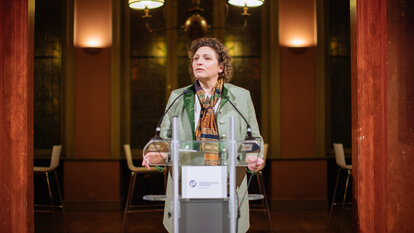
Nicola Beer, EU-Vizepräsidentin
© fnfEurope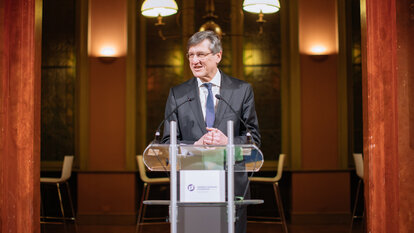
Prof. Dr. Karl-Heinz Paqué, Vorstandsvorsitzender der Friedrich-Naumann-Stiftung für die Freiheit
© fnfEurope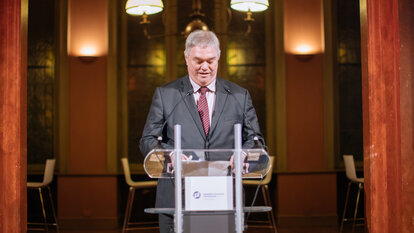
Jules Maaten, Regionalbüroleiter FNF Europa
© FNFEurope